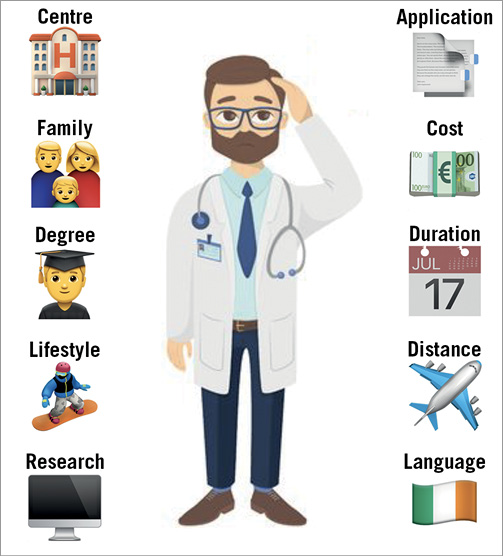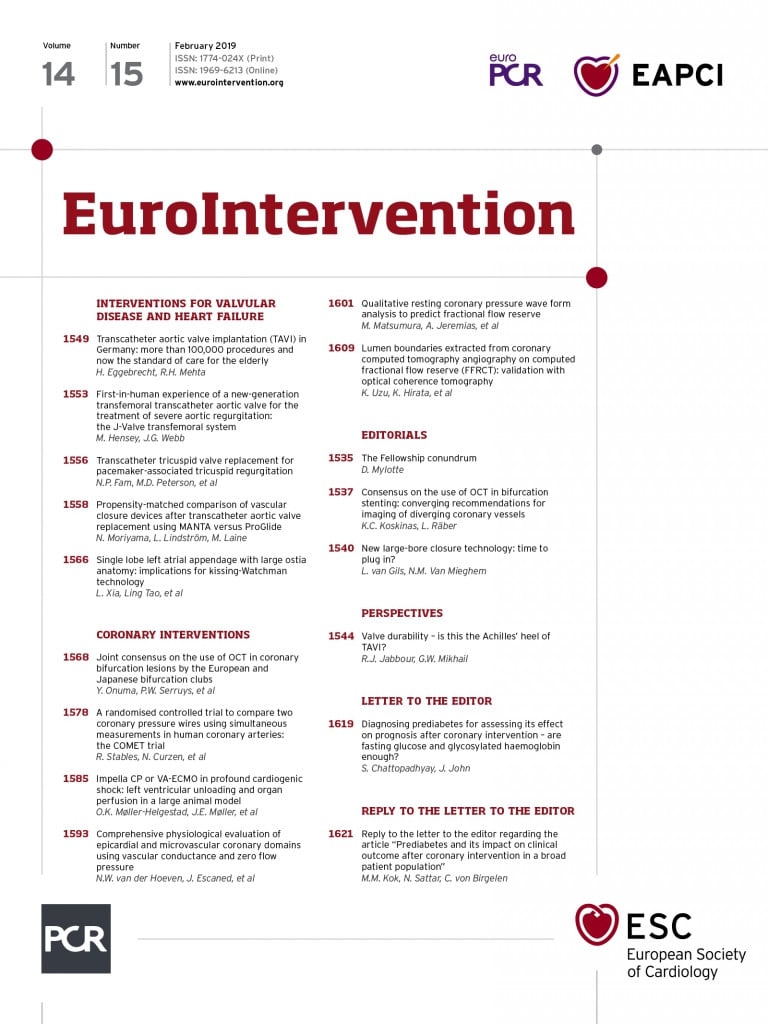
Over the last few weeks, our department has provided written and telephonic references for current and former interventional fellows keen on pursuing a period of further advanced training abroad. Some of these fellowship applications are at an advanced stage, but others are in the balance and it is not clear if they can be finalised before the start date. These precarious applicants compelled me to consider what advice I would offer to young colleagues facing the daunting task of securing a coveted fellowship.
Several factors must be considered when choosing an international fellowship (Figure 1). Foremost amongst these is to understand whether the proposed position meets the training needs and expectations of the candidate. Clearly, the availability of the post and the financial consequences of the additional training must be considered.

Figure 1. Fellowship considerations.
What kind of fellowship is required?
It is important to understand the goals of the fellowship and to assess whether the proposed attachment meets these expectations. Traditionally, most trainees expected to learn coronary intervention during a fellowship year, but the advent of structural heart intervention and an ever-increasing emphasis on clinical research offer the potential for more comprehensive training over a more protracted period of time. These latter elements should not be considered mandatory for all, but are certainly more fashionable in current practice. Some institutions insist on candidates committing to two years of training, one clinical and another in research.
A particular type of fellowship may be more suitable at a particular stage of one’s career. For example, it is customary to complete training in coronary intervention before starting a structural heart fellowship. A research fellowship can however be undertaken at any stage of training and can often be a key milestone in career development. A dedicated period of time learning the intricacies of trial design, statistics, writing skills, regulatory issues, monitoring, etc., can be extremely beneficial to enhance a career that has to date comprised only a heavy clinical case load. Certainly, publishing in peer-reviewed journals enhances ones curriculum vitae and can unlock new opportunity in a career that has stalled.
If coronary intervention is the focus of the fellowship, then it is essential to understand the breadth of experience that will be acquired. How many first operator procedures do trainees in this programme perform? What is the breakdown between coronary angiography and intervention? How many bifurcation, left main, or chronic occlusions are treated per annum? Does the host unit frequently perform intravascular imaging, rotational atherectomy, or coronary artery lithotripsy? Is there an opportunity to learn peripheral intervention? Are live cases or research trials part of the fabric of this unit?
Similarly, for structural programmes, how many transcatheter aortic valve implantations (TAVI) or mitral valve repair procedures will you be exposed to? Will you be first operator before the end of the placement? Is there an active left atrial appendage occlusion programme and are paravalvular leaks, atrial septal defects and patent foramen ovale cases undertaken? Can non-invasive imaging (echocardiography and computed tomography [CT]) skills be acquired in tandem?
For clinical research posts, the publication track record of the supervisor and the unit should be evaluated. Is it possible to perform a higher degree (PhD)? What research ideas or projects are planned? Are courses on statistics or scientific writing available? What opportunities will there be to present at international congresses? Is there an option to continue some clinical duties to maintain skills?
Financial considerations
International fellowships often present significant financial challenges. Indeed, financial planning for a fellowship should start years in advance. Although many positions will reimburse trainees, others will not or will offer a reduced level of remuneration. National and international bursaries or grants are available but can be difficult to secure. The European Association of Percutaneous Cardiovascular Interventions (EAPCI) offers education and training grants of €25,000 (50% assigned to female trainees) and should be considered by all fellows training abroad. Although the annual application deadline for these stipends falls in January, some months of preparation with the host site are required to be competitive. Other sources of income, such as on-call duties at host hospitals, can be undertaken to help reduce the financial strain during training.
It is imperative to know what expenses will be incurred by the fellow during training. For example, will conference registration fees and travel expenses be covered if oral or poster presentations are secured by the trainee? Are fellows expected to pay for imaging or statistical software?
Practical concerns
Fluency in the primary language of the host nation is clearly advantageous but not always mandatory. In Germany, however, a formal language examination must be overcome before clinical duties can be undertaken. The specific requirements of the receiving hospital should be discussed prior to application. For candidates from outside the European Union, securing a work permit can be problematic and the process of application and success rates should be investigated. Moreover, medical registration with the relevant authorities of the destination country is not always straightforward or feasible. Verification of certificates of the candidate’s undergraduate and postgraduate medical education can take many months and must be considered well in advance. The availability of affordable accommodation close to the hospital should be investigated.
Personal considerations
It is appropriate to consider how the fellowship will impact on one’s personal life. If planning to travel with a partner or children, how will they be affected by the move? Will a partner be able to work? Are childcare and schooling readily available and at what cost?
Although a fellowship is often considered to be all-consuming, it rarely is. There is always time to pursue interests outside the hospital. Can one’s personal interests be maintained or advanced during the training period? Is the host city/nation a desirable place to live for a year or more? Are parks, sports amenities, markets, shops, and nightlife accessible?
Information sources
Most information relating to potential fellowship positions can be sourced through individual hospital websites or human resource departments. It is crucial, however, to make direct contact with the fellowship director in order to start the application process. A formal introduction through a shared mentor or friend is advantageous. Otherwise, an introductory email with a concise curriculum vitae is the most common initial step. Medical human resources departments are vital sources of practical information.
Current or former fellows are the most important and robust source of information on a training programme. A telephone/Skype conversation with someone who has been through the application process and who can give factual information on the day-to-day functioning of the department is vital.
Final words of advice
The reputation of the host institution and the proposed trainer or mentor should be taken into account when choosing a fellowship; however, the actual performance of the site/mentor as described by past fellows is perhaps most relevant. If one is not sure about which institutions should be considered for a fellowship, consider perusing the pages of EuroIntervention or looking up the live case centres for EuroPCR for inspiration.
Finally, start the application process one to two years in advance. Figure out the financial implications and go to meet the proposed trainer at an international meeting or, better still, visit their hospital in person. You will not regret it.

